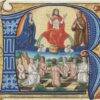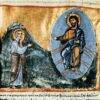Category: Evangelical Calvinist
Writings from the blog: Athanasian Reformed (aka The Evangelical Calvinist). Senior Reformed scholars present a coherent and impassioned articulation of Calvinism for today’s world.
The Eschatological Nature of Christian Theology
There is no reason to absolutize any period of theological history, per se. In other words, every season of theological development, within the Church’s history, is open for engagement. The Lord Himself said He would build His Church, and through Paul continued to say that He would, in particular, provide pastors and teachers, so on and so forth. This ought to teach us that Christ has been present, all along, in His Church. He hasn’t abandoned it or left it as orphans, but has provided His Holy Spirit to presence Himself and sacra doctrina among those who fellowship with Him…
Karl Barth’s Karl Marx: On the University Protests and Globalism
Economic materialism, more commonly known as Marxism is, of course, the philosophy/ideology that Karl Marx constructed; that is, to the world’s demise. It’s doubtful that Marxism is actually at play in what we are currently seeing take place at America’s Universities; that is, in regard to the recent and ongoing protests. There are clearly ideologues behind the scenes who are pulling strings in a way that might be somewhat Marxist in orientation, but I’d say that really it is just straight anarchic action with the goal of creating some type of internationalist revolution (which of course is pretty Marxist, eh)….
Church Culture isn’t the Gospel, isn’t God: On Deconstructing Deconstruction
Church culture isn’t the Gospel. Even so, it is what we most tangibly experience as Christians in the world. That kind of experience, as with any experience, can be either good, bad, or indifferent. Unfortunately, many these days (and in days past) are deconstructing. They are claiming to have this ‘come of age’ moment wherein they’ve finally come to realize that their respective evangelicalism[s], the cultures therein, have misrepresented God to them. The early mistake most of these folks make is to conflate their experience in various church cultures with God Himself. This represents some form of functional pantheism for…
Job’s Dramatic Irony: Getting God Right Through Suffering Rather than Nature
The biblical book of Job, literarily, operates with what is called dramatic irony. Here is how the Oxford Dictionary defines dramatic irony: a literary technique, originally used in Greek tragedy, by which the full significance of a character’s words or actions are clear to the audience or reader although unknown to the character.[1] As a reader, or even movie-watcher, we the audience have the capacity to read or watch with this type of ‘irony.’ We can skip to the end, and then read the beginning to the end, knowing what the final outcome is. Or we can read through a…
What is Man, O LORD? On a Spirit Grounded Humanity
What is man, O LORD? Since man has Him, the Spirit is certainly in man—in his soul and through his soul in his body too. It is the nearest, most intimate and most indispensable factor for an understanding of his being and existence. But while He is in man, He is not identical with him. We have seen already that this would imply a transformation of man into God, which is excluded by the fact that Spirit is a conception of activity. The Spirit is not transformed into the soul of man, although He first and supremely creates the soul…
“Beggars All”: On Abandoning the Progressive and Legalist Mode of Salvation
I don’t think I’ll ever understand the impulse towards perfectionism; not in light of the Gospel, that is. And yet it is rampant, especially as given non-stop expression on “Christian social media” (I’m mostly thinking of X/Twitter). There are always these extremes on a continuum. There are those who think to be anti-legalist is to be progressive and loose to everything. On the other hand, there are those who think to be holy (saved) is to be legalistic to the point that all of what they say about others never applies to them; as if they have perfectly arrived; as…
Finding Ourselves in Scripture’s Reality: With Reference to Dietrich
John Webster is commenting on Dietrich Bonhoeffer’s understanding of our relation to Scripture. It’s not as if we give scripture its ground through imbuing it with our exegetical prowess; no, it’s that our ground is given footing as we find ourselves related to God in Christ through the Scripture’s story. This fits with the point that Webster is driving at, over-all, throughout his little book, that Scripture should be seen as an aspect of soteriology—sanctification in particular. And that Scripture is a part of God’s triune communicative act, ‘for us’; caught up in His Self-revelation itself. In other words, for…
Barth on Adultery in the Church Dogmatics and 1 Corinthians 11
Photo copyright of the Karl Barth-Archiv in Basel, Switzerland Almost seven years ago now I wrote a post based on Christiane Tietz’s just released essay (at that point) where she offers some of Karl Barth’s and Charlotte von Kirschbaum’s love letters, translated for the first time from their original German into English. My initial blog post ended up going relatively “viral” in the theo-blogosphere, and eventually, beyond. My post, and then series of posts, was referred to by an article written by Mark Galli at Christianity Today, and then at Mere Orthodoxy and other like outlets online. A little later my…
On a Crucifixional ‘Certainty’ of Faith as Knowledge of God: With Reference to Herbert McCabe
Herbert McCabe on the certainty of the Christian reality (contra wishful thinking, so on and so forth): Now there are some people who will admit even this. They will admit that Christianity is reasonable even in this sense, that it is not merely logically coherent, but also a pretty reasonable hypothesis. They will admit that there is a lot of evidence of one kind and another to suggest that Christian beliefs are true, just as there is a lot of evidence of one kind and another to suggest that telepathy is quite common or that Queen Elizabeth I was in…
Calvin against the Calvinists: Alasdair Heron and Thomas Torrance on Calvin
Here is a quote from TF Torrance on how he believed John Calvin contributed to the theological world, and thus how he would think on how “Calvinists” have used Calvin in the wrong ways, and for wrong ends; essentially muting the seismic Calvin into the tremor Calvin that is only allowed to shake to rhythms presented by classic Calvinism of today and even yesterday. True, Richard Muller and other post-Reformed orthodox Calvinists like David Steinmetz have placed Calvin in Context, but whose context? You should read the whole essay that I pilfer this quote from, from Heron; he might provide you with a rounder understanding of Calvin, and…









